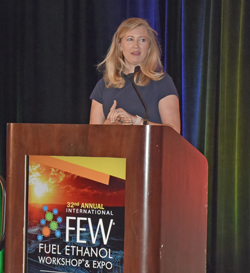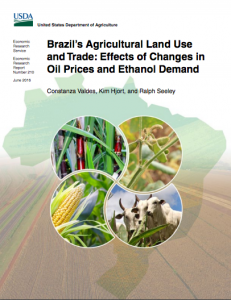U.S. ethanol exports reached a nine month low in May at 55.7 million gallons (mg) a 42 percent drop from April according to government data and analyzed by Ann Lewis, research analyst with the Renewable Fuels Association (RFA). Monthly ethanol exports have only dipped lower twice in the past two years. In May, Canada exported 21.5 mg taking the top spot while China exported 19.6 mg of ethanol. Year-to-date ethanol exports reached 400.7 mg, meaning, says Lewis, the industry is on pace to ship 962 mg in 2016.
 May exports of U.S. denatured fuel ethanol fell 16 percent from April to 31.0 mg. Most denatured product (19.4 mg, or 62%) crossed the border to Canada or was shipped to China (10.0 mg, 32%), with the remainder heading to Peru (1.7 mg). May exports of U.S. undenatured fuel ethanol droopped 58 percent from April to 22.0 mg. Top exporters were China (9.7 mg, or 44%), Brazil (6.0 mg, or 27%), South Korea (2.5 mg, or 11%) and Mexico (1.7 mg, or 8%). Several regular export markets with large volumes in April (e.g., India, the Philippines) were absent from the ledgers in May.
May exports of U.S. denatured fuel ethanol fell 16 percent from April to 31.0 mg. Most denatured product (19.4 mg, or 62%) crossed the border to Canada or was shipped to China (10.0 mg, 32%), with the remainder heading to Peru (1.7 mg). May exports of U.S. undenatured fuel ethanol droopped 58 percent from April to 22.0 mg. Top exporters were China (9.7 mg, or 44%), Brazil (6.0 mg, or 27%), South Korea (2.5 mg, or 11%) and Mexico (1.7 mg, or 8%). Several regular export markets with large volumes in April (e.g., India, the Philippines) were absent from the ledgers in May.
Lewis reports sales of denatured ethanol for non-fuel use in May retracted to a fairly normal level of 2.2 mg after surging to a near-term high in April. Canada exported nearly all of the volume at 2.1 mg. Sales of undenatured ethanol for non-fuel, non-beverage use was lower at 495,914 gallons. Mexico, South Korea and Taiwan together accounted for three-fourths of the total volume of undenatured industrial.
Moving on to imports, the first noticeable volumes of imports entered the U.S. in May, with 1.8 mg of undenatured ethanol coming from Guatemala and less than 20,000 gallons from the UK and France. Year-to-date fuel ethanol imports are just 1.9 mg, putting the U.S. on pace to import 4.6 mg in 2016.
U.S. distillers dried grains with solubles (DDGS)experienced sizable export growth in May with the third month-on-month increase. DDGS exports grew 20 percent to 1.06 million metric tons (mt), largely due to the doubling of export volumes to China over April levels. China imported 291,825 mt of DDGS in May, or 27 percent of the total. Exports to Mexico increased as well with 158,702 mt sold in May, while Turkey cut imports by a third to 105,584 mt. The remaining half of the U.S. DDGS exports in May were spread across 29 countries, with the largest volumes moving to Vietnam (91,850 mt), South Korea (55,019 mt), Thailand (51,033 mt) and Canada (42,521 mt). Year-to-date DDGS exports of 4.4 million mt indicate an annualized total of 10.6 million mt.











